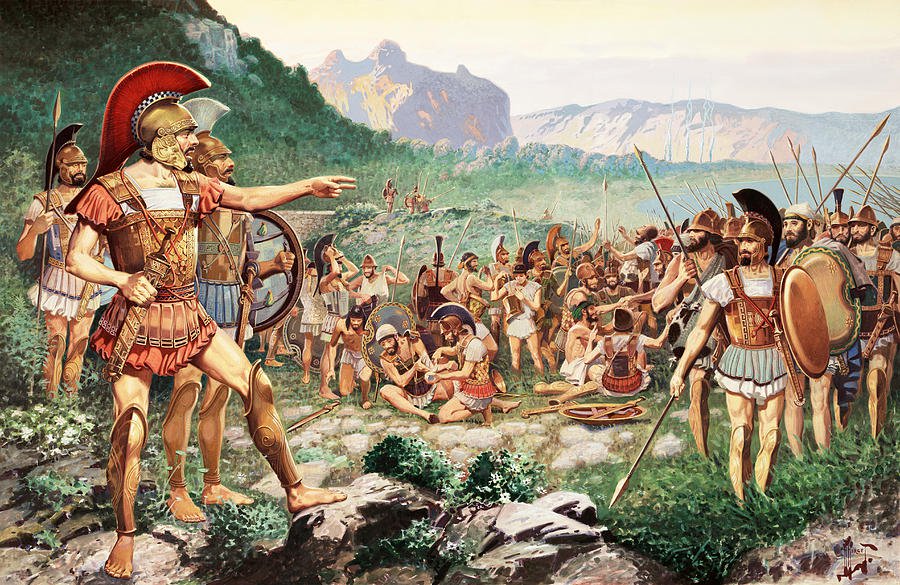One by one the Greek and Persian forces continued to slaughter each other in combat as they battled for nearly three days. As the Spartan-led Greek forces relentlessly continued to combat the Persians, King Leonidas fell with sword in hand, finally receiving the glory he ultimately desired through combat. His death was not untimely, but rather expected, as Spartans knew they should never retreat from battle, even when faced with inevitable demise.1
The ancient songs of war were played and written by the Spartans themselves, a glorious bunch. These Spartan warriors, through time, still continue to intrigue and amaze us today. Many of us have seen, or at least have heard of, the movie 300, featuring the famed Spartan warriors being glamorized through Hollywood theatrics. But what was it even about? 300 wasn’t just a movie for the sake of being a movie, but rather something greater. It was about Greek history and the tenacity of the ancient Greek Spartans and their ability to engage and endure combat relentlessly. While war is something we see much of in the ancient world, there are few battles that hold up in history and withstand the test of time. One of the most notorious ones is The Battle of Thermopylae.

As told by the ancient Greek historian Herodotus, the tale of the Battle of Thermopylae is comprised of many themes, including honor, betrayal, courage, and loyalty to the Greek city-states. An invasion from the Persian Empire of Xerxes was taking place, and decisions needed to be made. At the request of the Athenian general and politician Themistocles, King Leonidas I of Sparta rose to lead his Spartan forces to battle against the Persian army. Xerxes’ forces were preparing to advance through the pass at Thermopylae, which was the last natural barrier defending the Greek mainland. As Leonidas and his men marched to Thermopylae, other Greek city-states contributed troops to the effort, including the Phocians, and they all met alongside with Spartan forces to form a joint force. By now the force was composed of approximately 7,000 men. Together, the Spartan-Greek alliance continued to set forth towards the coastal-adjacent passage of Thermopylae to help defend the Greek mainland from the invasion. Leonidas decided to take his men and the accompanying forces to the middle gate of the Thermopylae pass, where the Phocian people, who lived south of it, had previously constructed a wall in the pass to defend from such invasions. Scholars estimate the Persian forces to have consisted of around 120,000-300,000 men strong when they faced off with the Greek forces.2 The Greeks didn’t know how large the Persian army was, but they knew of their might. The reality for them was simple and objective: they would be fighting not only for themselves, but for everyone they loved back home. They may have been from different city-states, but at Thermopylae, they were one force united behind one cause.
It is said by Herodotus that earlier in the year, Leonidas and his fellow Spartans had met with the High Priestess, or Oracle, in the Temple of Apollo located in Delphi. Leonidas had only chosen Spartans with living sons to take with him to combat after this visit.3 This is our first clue that Leonidas knew that perhaps he would have to sacrifice his life through combat eventually. The Oracle is said to have prophesied the following:
O ye men who dwell in the streets of broad Lacedaemon!
Either your glorious town shall be sacked by the children of Perseus,
Or, in exchange, must all through the whole Laconian country
Mourn for the loss of a king, descendant of great Heracles.4
After the Greeks finally made it into Thermopylae, they established camp at the wall for what would be seven days total. When the Persian army was eventually visible across the Malian Gulf, the Greek forces held a council of war. Some men wanted to retreat and defend the Isthmus of Corinth, but the Phocians grew weary, knowing their land was just south of Thermopylae. They were right to worry, but they were also right, to an extent, to trust Leonidas when he eased their fears, assuring them that they would defend Thermopylae. Adding to the list of decisions to make, Leonidas eventually received word of a path that could be used by the Persians to outflank them. He decided to place 1,000 Phocians on the mountainside to rectify the possible danger, having no reason to believe they would not prove to be reliable.5 With everything to consider, Xerxes sent an emissary to negotiate with Leonidas, presenting fair terms of surrender. But why would a glory seeking warrior and his people submit to surrender, to the will of another? The answer was that he wouldn’t. Upon refusal of accepting the negotiation terms, Xerxes demanded they lay down their arms, but to no avail. Xerxes allowed four days of delay, only to his dismay.
It wasn’t until the fifth day that Xerxes had become angered and decided it was time to commence the battle.6 Xerxes sent a force of roughly 10,000 men, only to prove being incapable of breaking the Greek defense. The Greeks fought in front of the Phocian wall, shoulder to shoulder, taking advantage of the most narrow part of the pass and using the least amount of men as possible. It was then that Xerxes wanted to utilize his elite force known as the Immortals, but they too failed in their attempt to destroy the Greek lines. Xerxes’ military may have been large, but it was impossible to make use of those numbers when fighting in a the confined space. Leonidas continued to use the narrowness of the passage to their advantage, utilizing what is known as a feigning retreat by running away from the Persian line only to turn around quickly and slay troops chasing after them. The fact that the Immortals used spears shorter than the Greeks did not help them either, thus reducing their tactical and geographical advantage even more. Even with such conditions, Leonidas and his company still faced a possible flank. But Leonidas kept in mind where he had stationed the Phocians, to defend against that possibility.

Xerxes needed something to give him a new tactical edge, to make this a more decisive battle, a key to ensure victory. That key was none other than Ephialtes of Trachis. Ephialtes was of the Malian Greek tribe, whose land spanned around what is the present day Malian Gulf. Ephialtes believed that if he helped the Persian King, he would be rewarded. Upon the second day of combat, in one of the greatest Greek betrayals in the ancient world, Ephialtes showed Xerxes and his forces a path around south of Thermopylae to the Greeks’ position.7 Phocian forces were placed topside the mountain for this very reason, but they were unprepared and did not expect to be met with a force of the magnitude that came. While they fled to the top of the mountain, the Persian forces continued past as fast as they could. Leonidas, who had become aware of this dire situation had to make a choice. Flee, or stand and fight. He had personally ordered many of the Greek allies away, knowing they would be killed if they stayed, but knowing also that he and his Spartan troops could not retreat from a position they had come to defend. For warriors as noble as some of the ones who joined with him, the decision for some to stay was of high conscience and glory seeking. With many Greek forces retreating, Leonidas and the rest of his men became a rearguard defending their retreat. Leonidas and his men had to continue to hold the battle for as long as they could. Had he not stayed, this would have opened the passage further for Persian forces to run down the retreating Greeks easily. With Leonidas and his final warriors most likely making peace with the gods and themselves, Herodotus says:
Here they defended themselves to the last, those who still had swords using them, and the others resisting with their hands and teeth.8
The decision to stay and fight to the death has sparked debate ever since the famed Spartans sacrificed themselves through combat. Some have argued that the act was merely the battle creed of the Spartans to never retreat from their post, but others argue that it was a tactical decision to allow other men to retreat. Regardless of the objective truth that may lie behind the confusion is that with this defeat, the Spartans and company granted the other Greek city-states the much needed time to continue allocating other resources and time for the defense of Greece. Though the Second Persian Invasion was not to succeed, the Battle of Thermopylae showed that the Greeks were composed of fearsome warriors to be reckoned with in battle.
- John Francis Lazenby, The Defense of Greece 490-479 B.C. (United Kingdom: Aris & Phillips, 1993), 144-145. ↵
- Tom Holland, Persian Fire: The First World Empire and the Battle for the West (New York: Doubleday, 2006). 394. ↵
- Alfred Denis Godley, The Persian Wars, Volume III (Cambridge: Harvard University Press, 1922), VII 205.1 ↵
- Rawlinson George, The History of Herodotus (London: John Murray, 1859), VII 242. ↵
- R. Hope Simpson, “Leonidas’ Decision,” Phoenix 26, no. 1 (1972): 4. ↵
- Alfred Denis Godley, The Persian Wars, Volume III (Cambridge: Harvard University Press, 1922), 7.210.1. ↵
- Salem Press Encyclopedia, January 2016, s.v. “Battle of Thermopylae,” by Chara Paul John, Jr. ↵
- Alfred Denis Godley, The Persian Wars, Volume III (Cambridge: Harvard University Press, 1922), 7.210.1. ↵



50 comments
Constantine James Markou
This battle started in the mind of King Leonidas ten years earlier from the Battle of Marathon. At this battle the Athenians , who were lesser warriors , under the General, Miltiades, defeated the Persians at this famous battle.
The Athenians were revered all over Greece, and the Parthenon was erected to honor them. The Spartans marched for days to partake in the battle, eager to show off their fighting skills, regretfully they arrived at Marathon , half a day late. The Spartans, deflated though they were, marched back to Sparta, ruing this missed opportunity.
Leonidas and his Spartans were not going to miss another chance to express themselves in battle again. After all they were elite warriors, this is what they excelled at, most of their lives. So Leonidas knew , the Persians were no match for his Spartans, and that they will make a stand for Greece and the free world. King Leonidas and his Spartans are immortalized, today for their heroism, courage ,valor and
skills as warriors and soldiers. King Leonidas and his Spartans got their opportunity to battle superior forces and they took full advantage of this, and they brought fame for themselves, their families, Sparta, Greece and the free world.
Gabriella Parra
It’s interesting that, in just one battle, we can see the differences between the cultures of the Greek poleis. Obviously, the Spartans valued military prowess, or they would have fled with the rest of the Greeks. It’s also interesting that they were understanding of this difference between their own culture and that of other Greek poleis. You picked a great story! One that I was not aware of before reading your article.
Joshua Zemanski
This was an amazing article that showed how brave the Spartans really were. Im writing about a battle as well but just on Alexander the Great and the “Siege of Tyre” where alexander had more of an overwhelming force. Its almost like i get t0 see it on the opposite side as this one. It was a really interesting article and great for me to eat that i see helping me write my article i’m working on.
Steven Valdez
This article really brought back a lot of nostalgia from researching about Thermopylae a long time ago. This story really went into great detail on how inspiring and brave the Spartans were. It really showed they would go through many lengths to defend their homeland from Xerxes and the Persians. It was pretty unfortunate that they were betrayed and why it happened. Overall, it was an amazing article!
Idaly Oropeza
The Greek and Persian battle lasted for about three days. The Spartans wrote the ancient songs of war. The movie “300” may just seem like any other movie however there is so much more to it. The movie emphasizes the grit of the ancient Greek Spartans. In the movie the amount of combat the Spartans were able to endure is shown. There are a few battles that to this day are spoken about, for example, The Battle of Thermopylae. This famous battle is mainly about honor, courage, betrayal and loyalty. The Spartans not only fought for themselves but for their loved ones back home. When the Greeks made it to Thermopylae, they stayed behind the wall for seven days or a week. After some thought, Xerxes became angry and gave in to start the battle. They fought in front of the Phocian wall, shoulder to shoulder. The whole battle was a big accomplishment for Sparta. They fought with honor and were proud to do so.
I loved the use of the pictures. The first picture was of the Greek bust Herodotus. This gave me a good way to visualize who he was. The map also helped me visualize the Persian and Greek movements of the battle. I feel that both pictures help the readers put two and two together.
Great article! I enjoyed reading it. You did an amazing job telling the story of the battle of Thermopylae. I found it extremely interesting and fun to read.
Abigail Delarosa
This article was full of information and sources. I learned so much more about the Spartan people and just how relentless they were. Your writing was so smooth and was easy to read. I enjoyed reading the article and great use of the image it helped me get a better visual on the battle and where exactly it took place.
Aurora Torres
Yes, I have seen the 300 movie but wasn’t sure if it was a trues story. But after reading this I now know that the Spartans Warriors were actually real Greek fighters that were very courageous, and would die to defend their land and people. I really do admire that they had a very strong leader Leonidas that knew he might have to die in the battle and made them aware that that is what they do to defend what is theirs and show no mercy. I was so caught up on the battle that for a minute there I really thought they had it and were going to win but after reading the part about Ephialtes I knew that their chances were not good at all. Sad to read that Ephialtes, gave up his people so he can be rewarded. Just because of this one person they lost and were killed. But each Warrior died with honor and love for their people. Thank you for this Great Article!
Joshua Marroquin
First of all, I would like to thank the author for writing such an entertaining article, it was also very informative. I was very interested in learning about ancient wars and how they started/ended. Since I am doing a project about the Spartans, it was very helpful towards me, since I learned a little bit more on how the Spartans fought.
Kayla Braxton-Young
I really enjoyed reading this article, it definitely talked about things that I didn’t really know about. Also I like how their was a lot of information in this article so that we could really understand what was really going on. I like how there were pictures so that we can visualize what it looked like as reading. I really enjoyed reading this article because I didn’t know a lot about this topic, but I actually learned something.
Halie Estrada
I loved this article, I’ve just recently started to learn more about the wars/ Battles of the ancient world and just how many occured. So to read about one of the most notorious battles was very intriguing to me. I love learning just how these battles/ Wars start and the many good or bad ways they may have ended; and I’m so thankful that in this article the author talks about the battle from point A to point B.